Film critics have become untrustworthy and irrelevant. Why do we still value their opinions?

Rotten Tomatoes has long been the most trusted source when it comes to getting a feel for movies and television shows. The site aggregates reviews from dozens, if not hundreds of trusted critics and determines if the reviewer gave a positive or negative score to the film. If negative, the movie gets a green 'rotten' tomato. If positive, it gets a 'fresh' red tomato. After weighing the ratio of rotten tomatoes to fresh, the movies gets a score based on the percentage of rotten to fresh.
In recent years, its become very apparent that critics are either irrelevant to what audiences think or let their values dictate wether or not something is good or not. A few examples:
Unnecessary sequels:
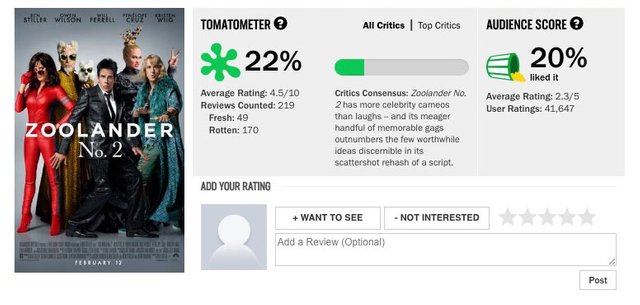
Audiences and critics both hated this unneeded sequel to Zoolander. Critics and audiences are even.

Fans and audiences similarly hated the Ghostbusters reboot, but it strangely has a 74% positive score from critics.
Netflix shows:
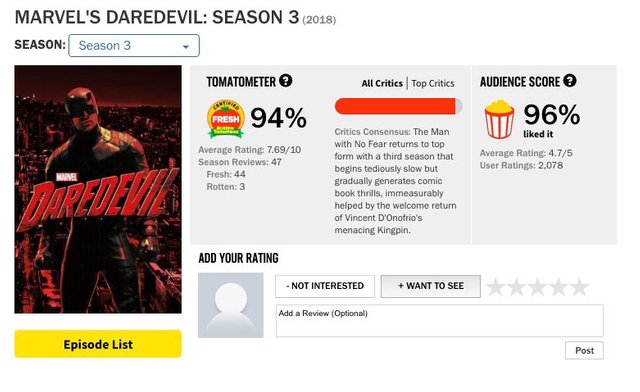
One of the most highly rated and fan-loved shows on Netflix. Critics and audiences agree.
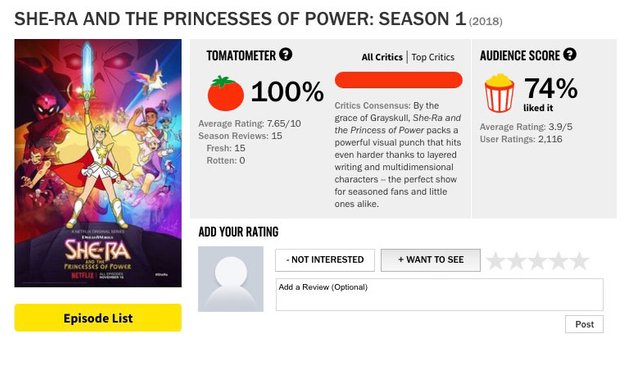
So how in the hell does this abomination of the classic 80's cartoon have a perfect score? A questionable selection of critics are found here, from sites that typically don't do TV/movie reviews. The user rating is suspect too, as a ton of 5-star reviews flooded in recently with no avatar and no review.
TV Reboots:
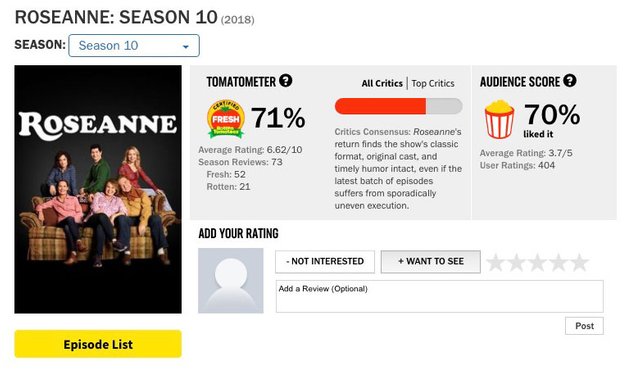
While she's a controversial personality, it seems the critics and audiences mostly agreed on this show.
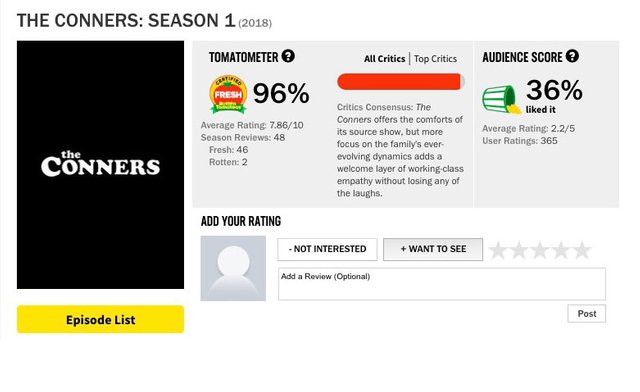
Though once they removed Roseanne from Roseanne, the critic score skyrocketed while the audience score plummeted.
Marvel movies:
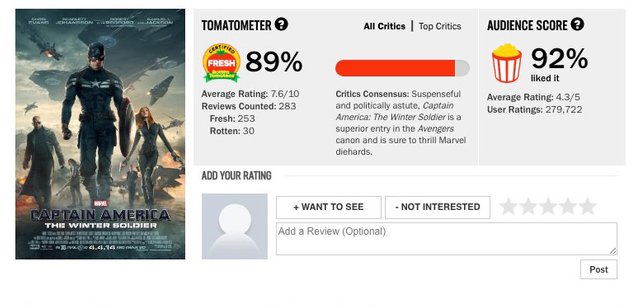
Captain America: Winter Soldier is universally regarded as the best film in the MCU. Critics and audiences agree.
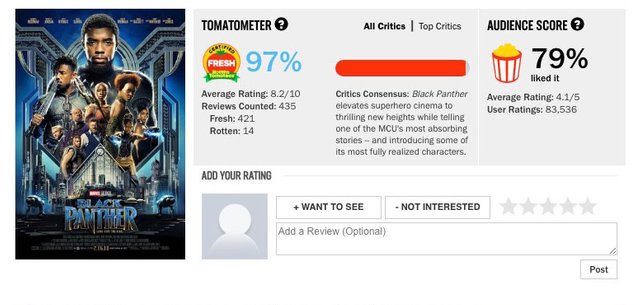
While one of the better films in the MCU, its score is highly suspect. 97% is higher than nearly every Best Picture winner since the year 2000. Were critics afraid to give this movie a negative review? After all, the first critic who showed up who didn't give it a fresh rating was called out as a racist.
Star Wars:

Everyone was disappointed with Episode 1. Ratings reflect that.
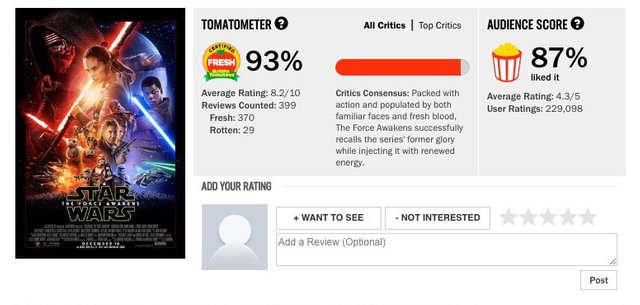
Most fans were happy with the first film in the new trilogy. Critics and audience scores are very close.
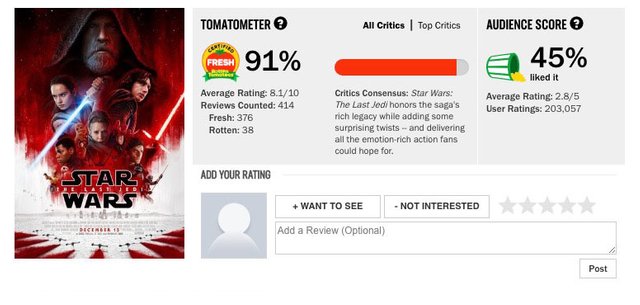
Fans HATED this entry in the franchise, but strangely the critics rated it about on par with the previous one. Why did critics and audiences agree on Episode 7, but critics loved Episode 8 while audiences hated it?
The common thread
The thing I see that's consistent through these shows and movies, where the critics scores deviate so far from similar properties or the audience scores, is that rather being objectively critical, tv and movie critics are now more likely to let their personal biases and beliefs dictate how they rate something.
This leads me to believe that who we're trusting as critics aren't capable of being impartial to judge a film or show's on its merit alone. Social or political messages in these properties seem to either increase or decrease their scores based on the critic's personal beliefs.
This disparity is no more visible than when examining highly partisan documentary filmmakers. Looking at Michael Moore vs. Dinesh D'Souza, they each make extremely partisan documentaries that exist to ramp up their bases. Moore is far left and D'Souza is far right and the films of both should be objectively and fairly critiqued as blatant political propaganda, yet Moore's films average around 75% positive while D'Souza's last three documentaries were rated 8%, 4% and 0%.
So if critics are unable to be impartial, what's the point of listening to them?
Personally, I quit listening to "professional" critics a long time ago and have started trusting film critics on YouTube instead. Chris Stuckmann, Jeremy Jahns and other YouTube film critics are far more fair, reasonable and share more in common with the audiences than 'real' critics. Writing for a newspaper or magazine used to mean the opinions of the critic had merit -- today it feels like it renders their opinions invalid.
What do you think? Have professional critics become pointless in the age of 'average joe' critics?

Even Roger Ebert got it wrong from time to time, but at least in most instances where he did, he came around and admitted it later. I see absolutely no chance of this happening with the current crop of critics, and it's mainly why I stopped reading professional critique and like you turned to YouTube reviewers who seem far more in tune with not only the films they are reviewing, but the history behind them.
Channels like RedLetterMedia and GoodBadFlicks have modernized film critique with their explorations of both new and old movies, while personalities like DeckerShado and Georg Rockall-Schmidtconstantly challenge themselves to up their game by tackling huge projects or taking a serious look at what might otherwise be dismissed as silly pictures or tropes of cinema. Rockall-Schmidt especially has a fantastic eye for asking sociological questions of films, and grinding forth in an effort to uncover the answer (or at least as close to a real answer as one can get without access to mind-reading tech).
Emer Prevost's "Reaction and Review" channel was one of my first YouTube film critique subscriptions, and I was shocked to learn he died last year. Complications from surgery. He was thirty-four years old, but I was far more familiar with his brand of film review than with any newspaper or magazine writer today. He was charmingly receptive to just about anything, and unlike some channels or reviewers who go over-the-top in a scripted attempt at comedy, the times when he's so gobsmacked at what he's seeing on screen that he can barely form coherent thoughts were refreshingly genuine. Watching him struggle through something like The Human Centipede or Salo, or the 120 Days of Sodom simply because somebody sent him a copy is comedy gold, because all the stammering and wonderment and discomfort were part of the real deal of who he was. I miss him something awful. :(
Lampyman101's critical look at the films embodied in the BBC's "Video Nasty" lists from early home video releases have taught me more about film history and criticism than any paid reviewer from the likes of Entertainment Weekly or Rolling Stone.
I don't think we've reached the point where professional film criticism is a dead art, but we're standing on the tipping point of making its current journalistic incarnation largely irrelevant. The gatekeepers of critique are no longer those who work for standard print media, and it's up to each of us to find a new set of sources and resources that we trust.
Some great suggestions there. I do watch RedLetterMedia and GoodBadFlicks, but I'll check out those others as well. Cinefix is by far the best channel on YouTube for taking a high-end, yet accessible look into the nuances of great filmmaking. Highly recommended.
Film criticism, much like awards shows, seem to be there for posturing within the industry rather than providing anything relevant to the masses. Most of the moviegoing public doesn't see the films nominated for best picture. An issue a lot of people have with critics and Hollywood is that it can come off as condescending, out-of-touch or snobby. I get that sense as well when I read reviews from mainstream critics, so I would rather go to real people to get their opinions.
YouTube reviewers are kind of the best marriage between professional criticism, while being relatable to everyday movie fans.
While no one can be unbiased, we're all influenced by our own preferences, including critics, critics will tend to be proper cinephiles. They'll judge movies passed on their artistic merit, performances, technical elements etc. A critic's judgement is based on how good the product is.
Audiences will judge it purely based on their enjoyment of it. It's why The Last Jedi scores differ so wildly. On a technical basis it is a good film, but the audience, which for the majority consists of fanboys (and girls), who don't like the direction the story took.
I'd like to think so, but it feels like film criticism is becoming more ideological and they're unable to leave their personal beliefs behind and review a film objectively.
I think most people agree that The Last Jedi's was a poorly written mess full of decisions that betray established character's personalities, nonsense that renders most of the villains as buffoons, a completely pointless subplot and things that simply conflict with basic science like gravity. It was technically brilliant, I fully admit that, but so were most of the DCEU films (minus Wonder Woman) and they suffer from many of the same problems that The Last Jedi has, yet they all hover around 25%-50% at Rotten Tomatoes.
I actually gave Last Jedi 3.5/5.
I don't mean to be disparaging if you enjoyed it. One of my best friends is a HUGE Star Wars fan and he liked it quite a bit.
I've always been more of a casual fan, which is possibly why I look at it little more favourably. My two friends who are proper SW freaks though both hate it.
Hi @retro-room!
Your post was upvoted by @steem-ua, new Steem dApp, using UserAuthority for algorithmic post curation!
Your UA account score is currently 4.480 which ranks you at #2002 across all Steem accounts.
Your rank has dropped 5 places in the last three days (old rank 1997).
In our last Algorithmic Curation Round, consisting of 404 contributions, your post is ranked at #272.
Evaluation of your UA score:
Feel free to join our @steem-ua Discord server